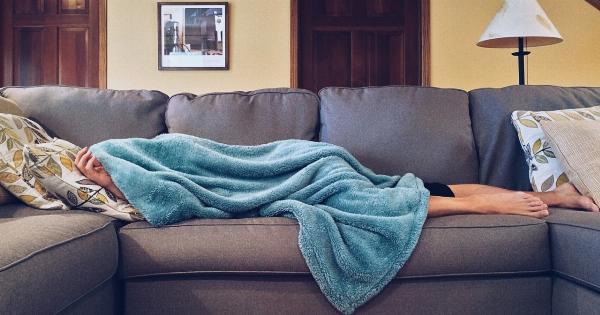Sleep is essential for our health and well-being. However, the way we sleep can greatly affect our overall health. Some sleeping habits may seem harmless, but they could actually be dangerous, causing potential harm to our health.
1. Sleeping on Your Stomach
Sleeping on your stomach may seem like a comfortable sleeping position, but it can be potentially harmful to your neck and back.
Since your spine is not in a neutral position, it can cause strain on your muscles and joints, resulting in back and neck pain. Additionally, sleeping on your stomach can cause breathing difficulties, especially if you are overweight. Lying facedown on your stomach could cause more pressure on your lungs and diaphragm, making it harder to inhale and exhale properly.
2. Sleeping with Your Pets
Sure, it’s great to cuddle with your furry friends, but sleeping with your pets can be hazardous to your health. Research shows that some animals, particularly cats, can carry diseases such as Toxoplasmosis.
This disease can cause serious harm to pregnant women and people who have weakened immune systems. Furthermore, pets can be disruptive to your sleep, leading to sleep deprivation and increased risk of accidents and injuries.
3. Sleeping with Your Head Covered
Sleeping with your head covered is not only uncomfortable, but it can also lead to suffocation. Covering your head while sleeping can increase the levels of carbon dioxide in your bloodstream, leading to headaches, dizziness, and in severe cases, death.
It’s important to keep the room well-ventilated while sleeping, especially if you’re using blankets or comforters.
4. Sleepwalking
Sleepwalking, also known as somnambulism, is a disorder in which a person walks or engages in other activities during sleep. It can be caused by underlying conditions such as sleep apnea, restless leg syndrome, or stress.
Sleepwalking can be hazardous, especially if the person engages in dangerous activities such as driving or cooking. It’s important to seek medical attention if you suspect you or someone you know is sleepwalking.
5. Sleeping with Electronics
Sleeping with electronic devices such as smartphones, tablets, and laptops can be harmful to your sleep cycle. These devices emit blue light, which can suppress melatonin production, making it harder to fall asleep.
Moreover, the constant beeping, buzzing, and ringing sounds can disrupt your sleep, leading to sleep deprivation and increased risk of accidents and injuries. It’s recommended to switch off electronic devices at least an hour before sleeping to ensure a good night’s sleep.
6. Sleeping in an Unsupportive Mattress
Your mattress is an important factor in determining the quality of your sleep. A mattress that’s too soft or too hard can cause discomfort, leading to back and neck pain.
Furthermore, it can affect the alignment of your spine, leading to muscle strains and sprains. A supportive mattress can help you sleep better and wake up refreshed.
7. Sleeping on Your Side
Sleeping on your side is considered to be one of the best sleeping positions for your health. However, it’s important to ensure that your spine and neck are properly aligned.
Placing a pillow between your knees can relieve pressure on your hips and lower back. Moreover, using a supportive pillow can prevent neck pain and headaches.
8. Snoring
Snoring is a common sleeping problem that affects a large portion of the population. However, it can be a sign of an underlying condition called sleep apnea.
Sleep apnea is a disorder in which breathing is repeatedly interrupted for brief periods during sleep. This can lead to excessive snoring and daytime fatigue. It’s important to get evaluated by a medical professional if you suspect you or someone you know has sleep apnea.
9. Drinking Before Bedtime
Drinking before bedtime can be harmful to your sleep cycle. Alcohol can act as a sedative, making it easier to fall asleep. However, it can also disrupt your sleep cycle, leading to a poor quality of sleep.
Moreover, drinking can increase the need to urinate, leading to sleep disruptions and increased risk of accidents and injuries.
10. Using Sleeping Pills
While sleeping pills can help you fall asleep, they can also be potentially dangerous. These medications can be habit-forming, leading to dependence and withdrawal symptoms.
Moreover, they can cause side effects such as dizziness, drowsiness, and difficulty concentrating. It’s important to consult with a medical professional before taking any sleeping pills.































